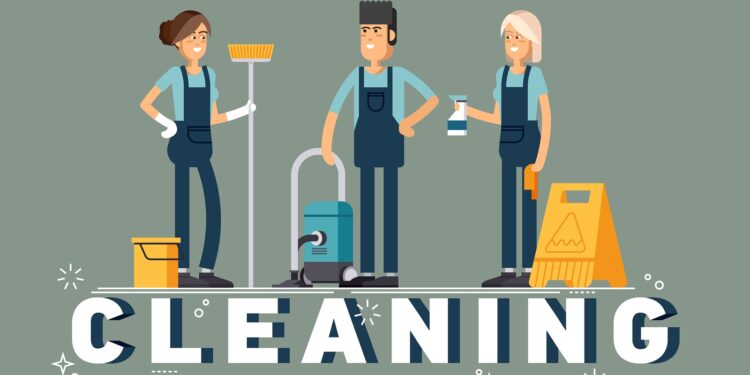A clean workplace isn’t just aesthetically pleasing; it can profoundly impact the psychological well-being of employees.
In today’s fast-paced work environments, where stress levels are often high, maintaining a clean workspace is essential for fostering a positive atmosphere and promoting productivity.
This article delves into the psychological implications of a clean workplace and how it can boost employee morale and satisfaction.
The Influence of Environment on Psychology
Exploring how our surroundings shape our mental well-being, this discussion delves into the profound impact of environmental conditions on human psychology, shedding light on how tidiness or disorderliness can influence emotions and stress levels.
Understanding the Link
Psychologists have long acknowledged the significant influence of environmental factors on human behavior and emotions.
The places where we spend most of our waking hours, such as workplaces, hold particular sway over our psychological state.
A cluttered or dirty environment can contribute to feelings of stress, anxiety, and even depression.
Impact on Mood and Stress Levels
Research indicates that a clean and organized workspace can have a calming effect on individuals, reducing stress levels and promoting a more positive mood.
Conversely, a disorganized or messy environment can lead to feelings of overwhelm and distraction, hindering productivity and creativity.
Employee Morale and Satisfaction
Creating a clean and organized workplace not only boosts morale but also cultivates a sense of pride and professionalism among employees, leading to higher job satisfaction and enhanced commitment to the company.
Creating a Positive Atmosphere
A clean workplace, maintained through regular workplace cleaning, contributes to the creation of a positive atmosphere where employees feel valued and respected.
When employees enter a tidy and well-maintained environment, they are more likely to feel motivated and engaged in their work.
This sense of pride in their surroundings can significantly impact morale and job satisfaction.
Sense of Professionalism
A clean workspace also reflects positively on the organization as a whole. It conveys professionalism and attention to detail, which can enhance employees’ perception of their employer and instill confidence in the company’s leadership. This, in turn, fosters a sense of loyalty and commitment among employees.
Productivity and Focus
In the quest for peak performance, a clutter-free workspace is key. By minimizing distractions and promoting efficiency through organization, employees can channel their focus into tasks, maximizing productivity and meeting deadlines effectively.
Minimizing Distractions
A clutter-free workspace minimizes distractions, allowing employees to focus their attention on their tasks more effectively.
When desks are organized, and surfaces are clean, employees can devote their energy to their work without being sidetracked by clutter or mess.
Promoting Efficiency
A clean environment promotes efficiency by streamlining workflow processes. When everything is in its rightful place, employees can locate necessary materials and resources more quickly, reducing time wasted on searching for items.
This streamlined approach to work enhances productivity and ensures that deadlines are met more consistently.
Health and Well-being
Maintaining a clean workplace goes beyond appearances—it significantly impacts employee health and well-being.
A hygienic environment reduces the spread of germs and improves indoor air quality, promoting a healthy workforce.
Reducing the Spread of Illness
Maintaining a clean workplace isn’t just about aesthetics; it’s also about promoting employee health and well-being.
A clean environment helps minimize the spread of germs and bacteria, reducing the risk of illness among employees.
This is particularly crucial in shared spaces where multiple individuals come into contact with surfaces and equipment.
Improving Air Quality
Regular cleaning and proper ventilation contribute to better indoor air quality, which is essential for respiratory health.
Poor air quality can lead to a range of health issues, including allergies and respiratory infections.
By ensuring that the workplace is clean and well-ventilated, employers can create a healthier environment for their employees.
Implementing Effective Cleaning Practices
In a bustling workplace, fostering collaboration and teamwork is paramount for achieving collective goals.
A clean and organized environment sets the stage for enhanced unity among employees, fostering a culture of cooperation and shared success.
Establishing Cleaning Protocols
Employers play a crucial role in creating and maintaining a clean workplace environment. Establishing clear cleaning protocols ensures that cleaning tasks are carried out regularly and thoroughly.
This may involve assigning specific cleaning duties to employees or hiring professional cleaning services to ensure that the workplace remains tidy and sanitary.
Encouraging Employee Participation
Encouraging employees to take ownership of their workspace can also contribute to a cleaner environment.
Providing adequate storage solutions and organizing systems empowers employees to keep their desks and work areas tidy.
Additionally, promoting cleanliness as part of the company culture reinforces the importance of maintaining a clean workplace for everyone’s benefit.
Fostering Collaboration and Teamwork
In a bustling workplace, fostering collaboration and teamwork is paramount for achieving collective goals.
A clean and organized environment sets the stage for enhanced unity among employees, fostering a culture of cooperation and shared success.
Creating a Unified Environment
A clean workplace fosters a sense of unity among employees, promoting collaboration and teamwork.
When shared spaces are tidy and well-maintained, employees are more likely to respect communal areas and work together harmoniously.
This collaborative atmosphere encourages open communication, idea-sharing, and problem-solving, ultimately leading to greater innovation and productivity.
Enhancing Interpersonal Relationships
A clean workspace fosters better social interactions among employees, strengthening bonds and minimizing conflicts.
Comfort in the environment promotes stronger relationships and a more cohesive team dynamic.
Conclusion
In conclusion, the psychological impact of a clean workplace cannot be overstated. Beyond mere aesthetics, a clean and organized environment has profound effects on employee morale, satisfaction, productivity, and health.
Employers who prioritize cleanliness demonstrate their commitment to creating a positive and supportive work environment, ultimately benefiting both their employees and the organization as a whole.
By understanding and harnessing the psychological benefits of a clean workplace, employers can cultivate a more engaged, motivated, and productive workforce.







